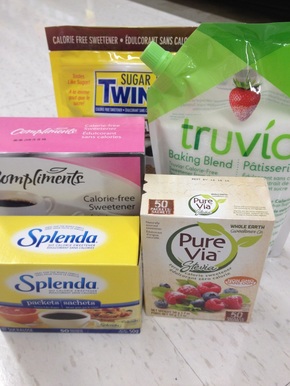
There are many reasons why people choose to include sugar substitutes in their diet. For example, diabetics use them to control blood glucose levels, and many people use them to control calorie and sugar intake. Others use them to help prevent the tooth decay associated with sugar consumption. Regardless of the reason, sugar substitutes are widely used. Splenda alone generated sales of $287.8 million in the US in 2012 (http://www.statista.com/statistics/328748/us-retail-sales-of-splenda-artificial-sweetener/). At the same time, the media often mentions the negative effects of sugar substitutes so it is easy to be confused or to be convinced that sugar substitutes should be avoided. I chose to explore the truth behind sugar substitutes so I could share my thoughts with you.
Question 1: What are the current sugar substitutes available on the Canadian market, where do we find them in food products and are they safe to consume? If so, how much?
All sugar substitutes are metabolized differently in the body and therefore have a different effect on blood sugar levels as compared to sugar. Some sugar substitutes, such as Splenda, are minimally absorbed in the small intestine (less than 25%) which is why it provides 1 calorie/gram as compared to the 4 calories/gram found in table sugar.
The sugar substitutes regulated for use in Canada include sucralose (Splenda), aspartame, stevia, sugar alcohols, saccharin and cyclamate. Each of these have their own regulations on how they can be sold and what food products they can be used in. It is important to understand that sugar substitutes are considered safe when consumed in quantities outlined by their Acceptable Daily Intakes (ADI) set by Health Canada, which range from 40mg/kg/day (aspartame), 11mg/kg/day (Cyclamate), 9mg/kg/day (Splenda), to 4mg/kg/day (Stevia).
Aspartame is the sugar substitute that is probably the most well known. It is found in soft drinks, desserts, cereals, candies, gum, etc. It is a chemical that consists of 2 amino acids: aspartic acid and phenylalanine. Those who are living with phenylketonuria (PKU) must avoid aspartame due to its phenylalanine content. Most people can safely consume aspartame up to the ADI (40mg/kg body weight/day), however there is research showing that individuals who are susceptible to migraines may want to avoid aspartame.
Sucralose (Splenda) is another widely used sugar substitute. It is often found in baked goods, mixes for baked foods, as well as candy and soft drinks. Splenda is heat stable which is why it is often used in baked goods. Sucralose is made by replacing three ‘OH’ groups on a sugar molecule with chlorine. It is not broken down in the body the way sucrose (table sugar) is and therefore intestinal absorption is minimal. Like aspartame, sucralose may be linked to migraines. Sucralose is considered a safe sugar substitute when consumed below 15mg/kg body weight/day.
Sugar alcohols are ‘polyols’ which are found naturally in some fruits and vegetables. Those living with IBS or IBS-like symptoms may experience gastrointestinal (GI) or abdominal distress after consuming sugar alcohols as they are only partially absorbed in the intestine. Everyone should avoid consuming more than 10g/day of sugar alcohols, including the naturally occurring polyols in fruits and vegetables.
Saccharin and cyclamate (Sugar Twin or Sweet ‘N Low) are other sugar substitutes commonly seen in Canada. Neither are considered safe for children under 2 or for pregnant women. Otherwise, the ADI for saccharin is 0-5mg/kg body weight/day. These products are only approved as table-top sweeteners and therefore are not found in processed foods like baked goods and treats.
Lastly, stevia is a plant based sugar substitute that is extracted from stevia plant leaves. It is used as a table-top sweetener and is found in many natural health products as well as candy, gum, baking mixes, and snacks. The ADI for stevia is 4mg/kg/day.
Question 2: Do sugar substitutes deliver the results we are looking for? Such as reduced blood sugar levels, weight maintenance and a decrease in tooth decay?
In terms of dental health, sugar substitutes are generally deemed ‘tooth friendly’ as they are not fermented like sugar by bacteria in the mouth and therefore do not cause dental decay. Sugar alcohols, in particular, may reduce the risk of dental caries.
Given that the use of sugar substitutes is typically associated with wanting to control calorie and sugar intake, it is important to note that there is currently no known relationship between the use of sugar substitutes and weight maintenance. (http://www.efsa.europa.eu/sites/default/files/scientific_output/files/main_documents/2229.pdf).
For those trying to control post-meal blood sugar levels (i.e. diabetics), sugar substitutes have been seen to be beneficial in reducing these rates. However, there has been no observed cause and effect relationship between sugar substitutes and the maintenance of normal blood glucose concentrations overall.
Question #3- Given that the benefits of sugar substitutes are generally not well founded, what is the best course of action to take in terms of weight maintenance and blood glucose control?
Rather than replacing sugar with alternative sweeteners, it is best to practice retraining your taste buds to enjoy semi-sweet foods, portion control, and consuming naturally sweetened fruits and vegetables. Otherwise, choose natural sweeteners such as raw honey, pure maple syrup, or blackstrap molasses as sugar sources because they provide nutrients along with a sweet flavour. Practicing portion control is key in this scenario. For example, 1 tsp of honey in a cup of coffee should suffice.
The way to weight maintenance and blood sugar control is not through the substitution of sugar with sugar substitutes but through a highly nutritious, well-balanced, varied diet with proper portion control.
To find out more, contact me at: Nicole.marchand@eatwellhalifax.ca or check out my website at www.eatwellhalifax.com.
Eat Well, Halifax
Nicole Marchand, RD
